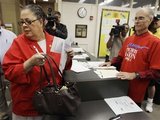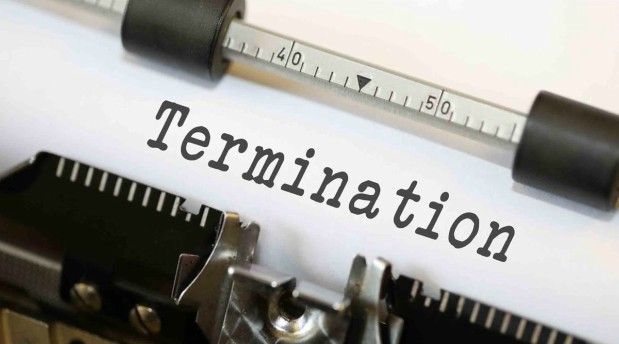Chicago Teachers Vote To Authorize First Strike In A Quarter-Century
Post Views 1
The teachers union says that retracting on their promise of a raise was hard to take, but worst was asking the teachers to prolong working hours, without adequate rise in pay, was the final straw that broke the camel’s back.
Evidencing that they have had enough and are willing to take no more, the teachers are voting this week on a strike, which if authorized, would probably take place after the next academic year commences. If the vote comes in favor of the strike, teachers said that the final decision of when to strike would rest in the hands of the union leaders.
The decision to vote is not sudden or impulsive, negotiations throughout the summer and a recommendation from an independent fact-finder failed to resolve matters. If the strike happens, it will be the first in 25 years in the country’s third largest school district.
“This is a reflection of the treatment we as teachers have been subjected to this year … that the posturing of the board of education has created such misery and suffering and discontent that we needed to send a message,” said David Rose, a teacher at Roberto Clemente Community Academy.
Frustrations reached flash point when Mayor Rahm Emanuel, overturned a 4 percent raise undertaking and then to add insult to injury began to push for longer school days. Teachers say that the district did not match their plans for longer working days with extra pay for the added time.
The proposals from both the sides are diverse and the gap is wide. Chicago Public Schools have proposed a Chicago Public Schools has suggested a five-year deal, with a guaranteed 2 percent raise in the first year. The raise however would lengthen the school day by 10 percent. However the union wants a two-year deal that reduces class size and calls for teachers to receive a 24 percent pay raise in the first year and a 5 percent pay raise in the second year.
For the teachers to authorize the strike, a little more than 19,000 teachers would have to vote in favor of striking. A new Illinois law mandates that of the 25,500 teachers in the district, at least 75 percent would have to vote for the strike.
Rose and other teachers said that given the extent of bitterness and resentment, there was no apprehension that the 75 percent line would not be breached. The union is likely to release results next week.
“I think it’s going to be in the 90s because we are very angry,” said Zulma Ortiz, a teacher at John F. Kennedy High School on the city’s southwest side. “We’re fed up.”
Mayor Rahm Emanuel, sensing the growing anger advocated restraint and said that personally he thinks teachers do deserve a raise but hoped that “common ground” could still be found. He recommended that the teachers wait for the fact-finder’s report, which is due in mind-July and would offer recommendations for a contract.
But the Mayor’s rigid stance has not won him many friends in the teaching fraternity. He has had a contentious relationship with them ever since he took over, using every method possible to bulldoze his way through with his proposals.
“He created an incentive for them, the causes and conditions for teachers to mobilize in a way they haven’t mobilized before,” said Robert Bruno, a professor of labor and employment relations at the University of Illinois at Chicago.
Strike authorizations are fairly common but strikes are not as not all authorizations lead to strikes. Most end in an anti-climax with both sides resolving the matter before things get out of hand. The last strike in Chicago was in 1987.
By saying that the strike will probably take place in the next academic year, Emanuel and the district allege that the union is jumping the gun. 1,500 teachers due to retire at the end of this year, will be voting on an issue that has no bearing on their careers and the new teachers, will be joining work changed by a vote in which they had no say.
Chicago Public Schools spokeswoman Becky Carroll said that, both sides will have 15 days to accept or reject the fact-finder’s report when it comes out. The union, Carroll said, will have 30 days to decide whether or not to strike.
Teachers should know what that report says before giving their leaders the authority to send them on strike, Carroll said.
“Once they vote to authorize a strike there is not a second bite at the apple,” she said. “The only other vote the teachers will have is to ratify the final agreed upon contract.”
Whether the strike goes ahead or not, Chicago Teachers Union Vice President Jesse Sharkey feels that it will provide them with additional leverage during negotiations.
The Parents are extremely worried how things are going to pan out. The district has about 405,000 students in more than 675 schools. Parents are anxious about their education and their safety.
“The gang violence in my neighborhood is way too high to risk having children home on a daily basis when they should be in school,” said Letitia Daniel, whose 11-year-old boy goes to school on the city’s South Side.
Her sister, Felisha Slater, said that the school to which her two young sons attend elsewhere in the city also provides meals to its students.
“Some of the kids, their parents can’t afford to buy food for their families, and they get fed at school,” she said.
Chicago Teachers Vote To Authorize First Strike In A Quarter-Century by Harrison Barnes


 Back-to-School Brings Unnecessary Stress for Working Parents
Back-to-School Brings Unnecessary Stress for Working Parents  Generation Y is Changing Corporate America
Generation Y is Changing Corporate America  Telecommuting Doesn’t Work for All Jobs
Telecommuting Doesn’t Work for All Jobs  10 Steps to Properly Fire an Employee
10 Steps to Properly Fire an Employee  5 Ways You Can Hire and Keep the Best Employees for Your Company
5 Ways You Can Hire and Keep the Best Employees for Your Company  Top 10 Ways to Effectively Manage a Team
Top 10 Ways to Effectively Manage a Team  Fake FMLA Requests Can Be Overcome
Fake FMLA Requests Can Be Overcome  The Most Popular 20 Employer Articles for Gig in 2015
The Most Popular 20 Employer Articles for Gig in 2015